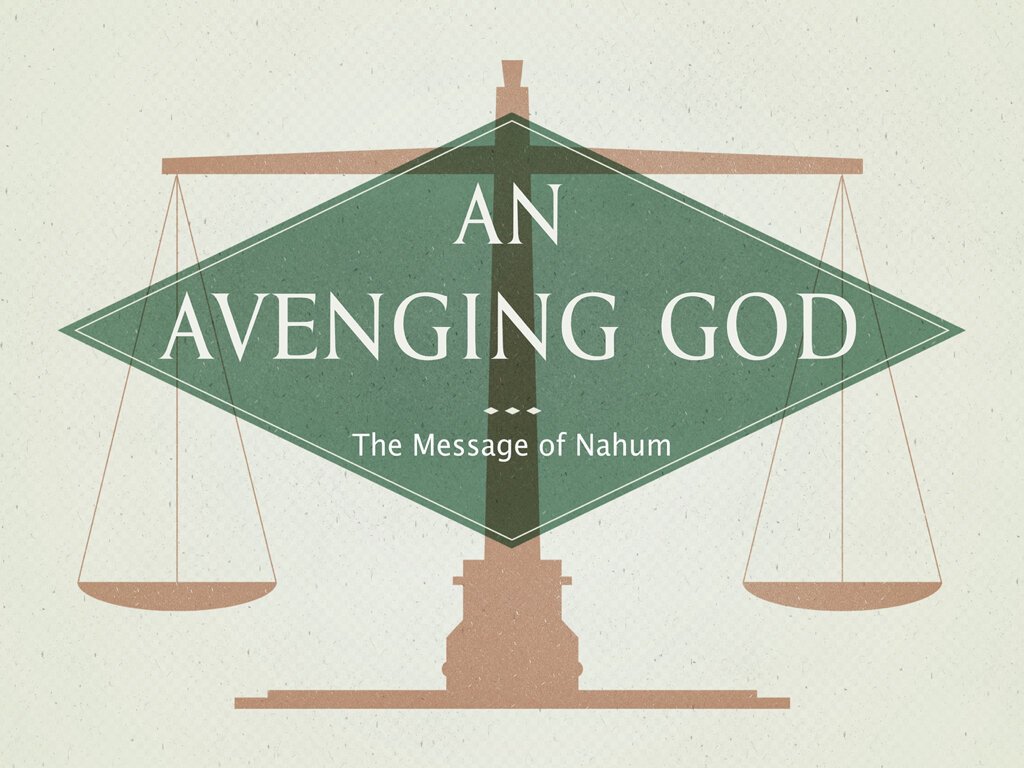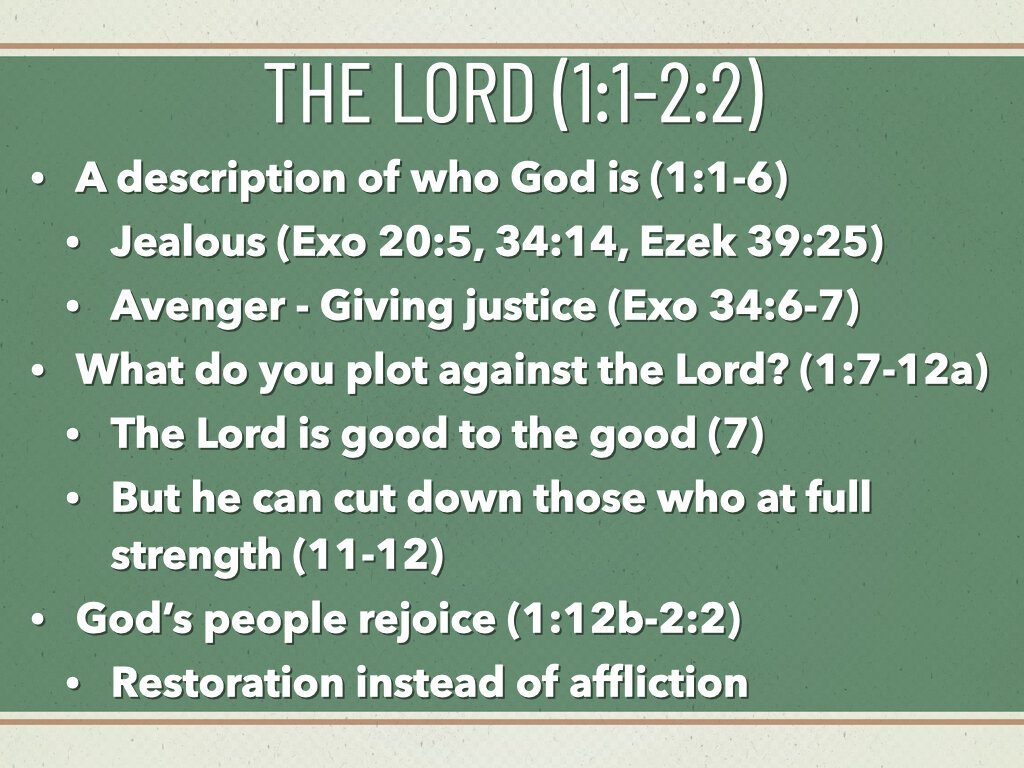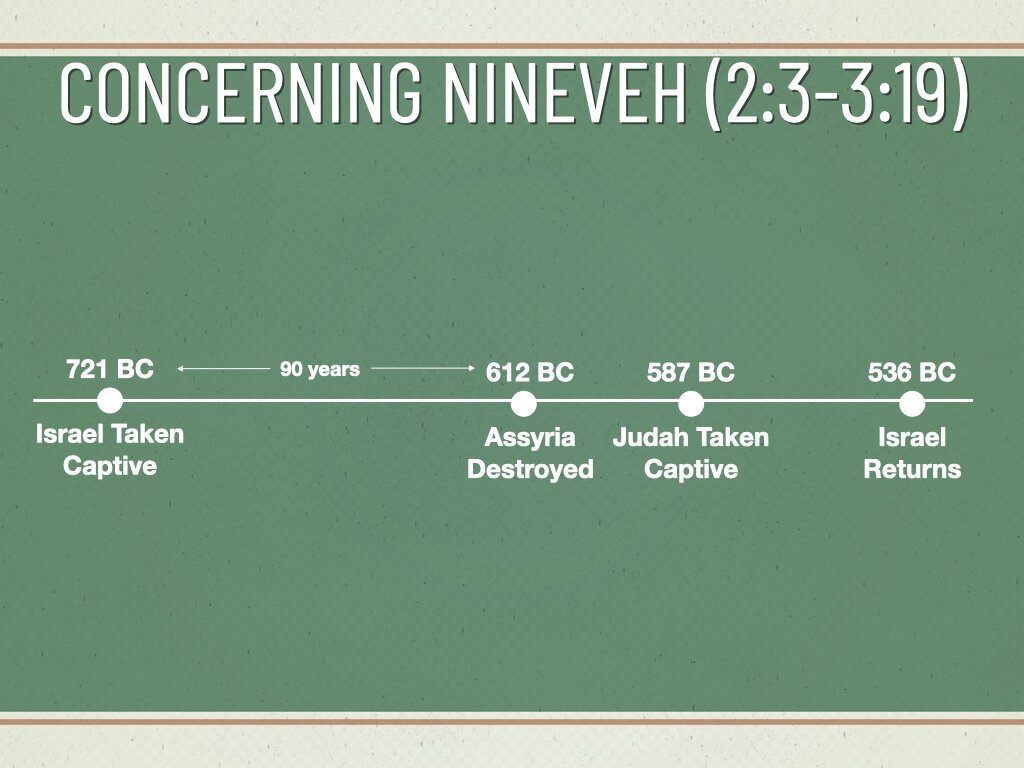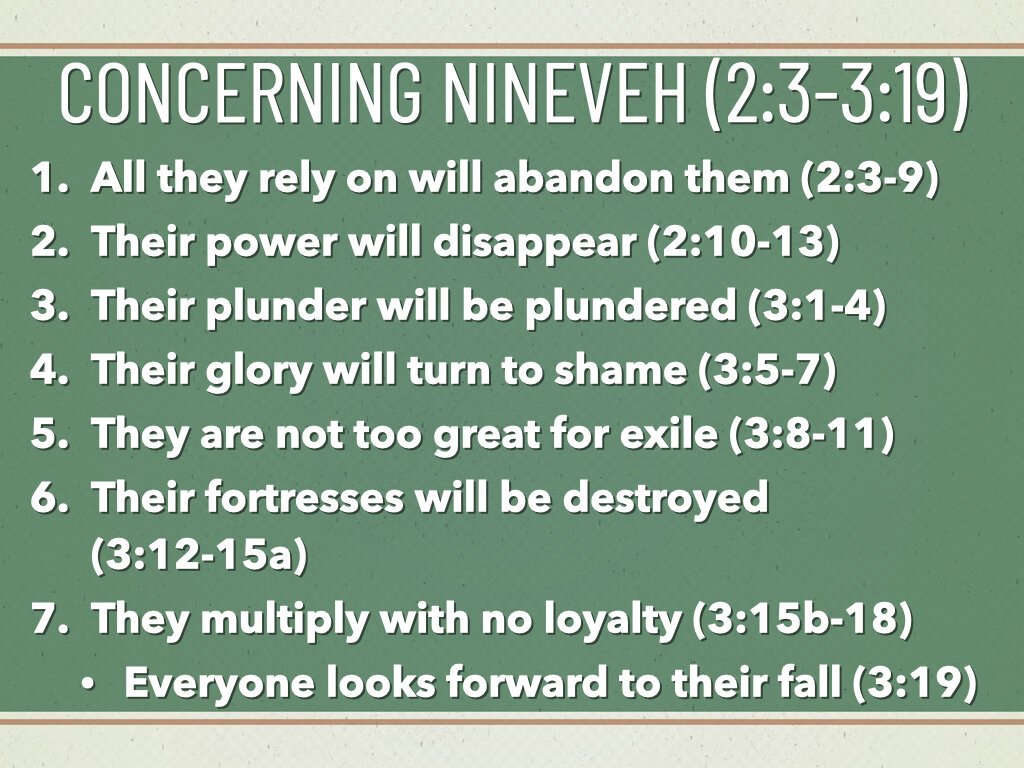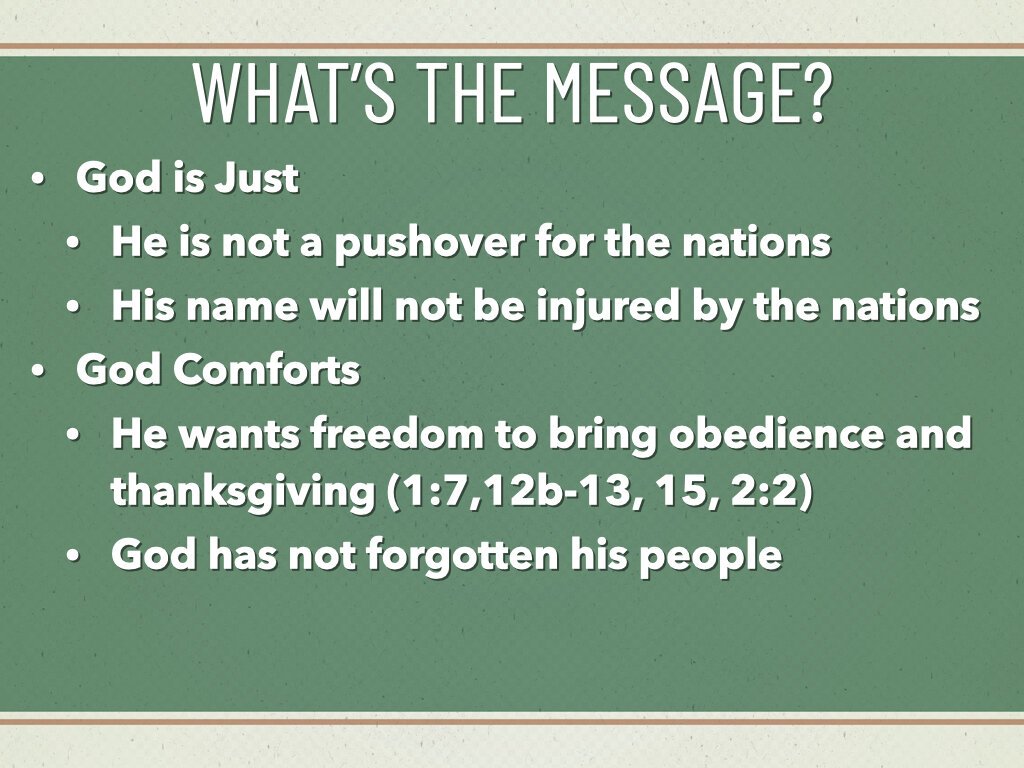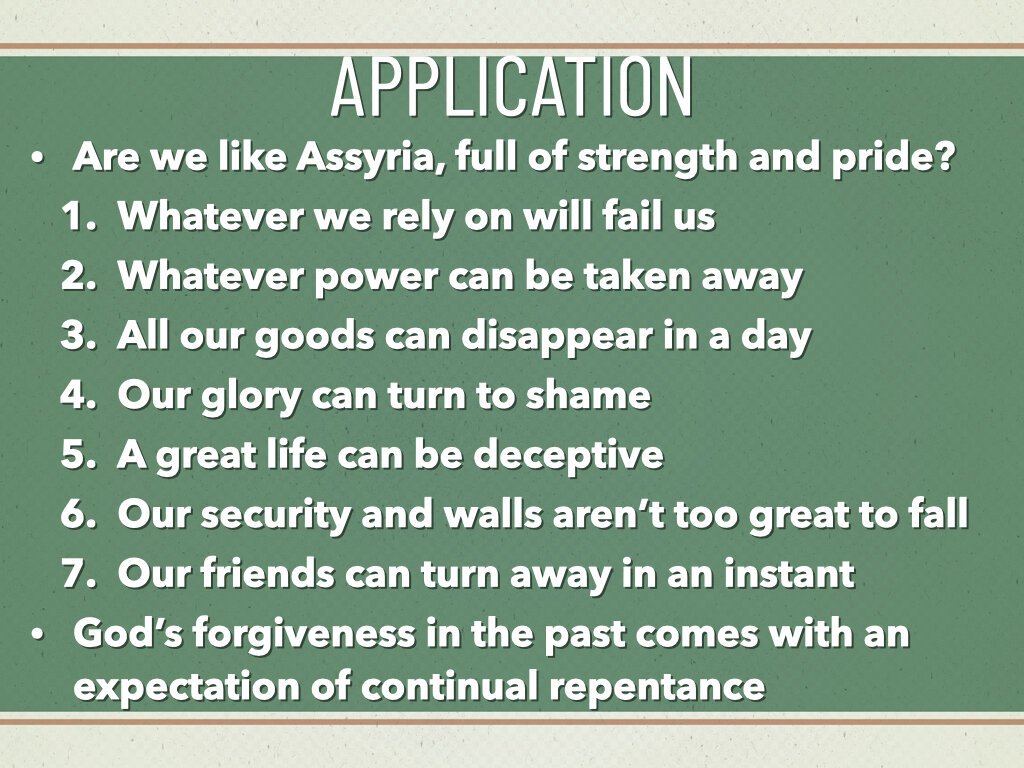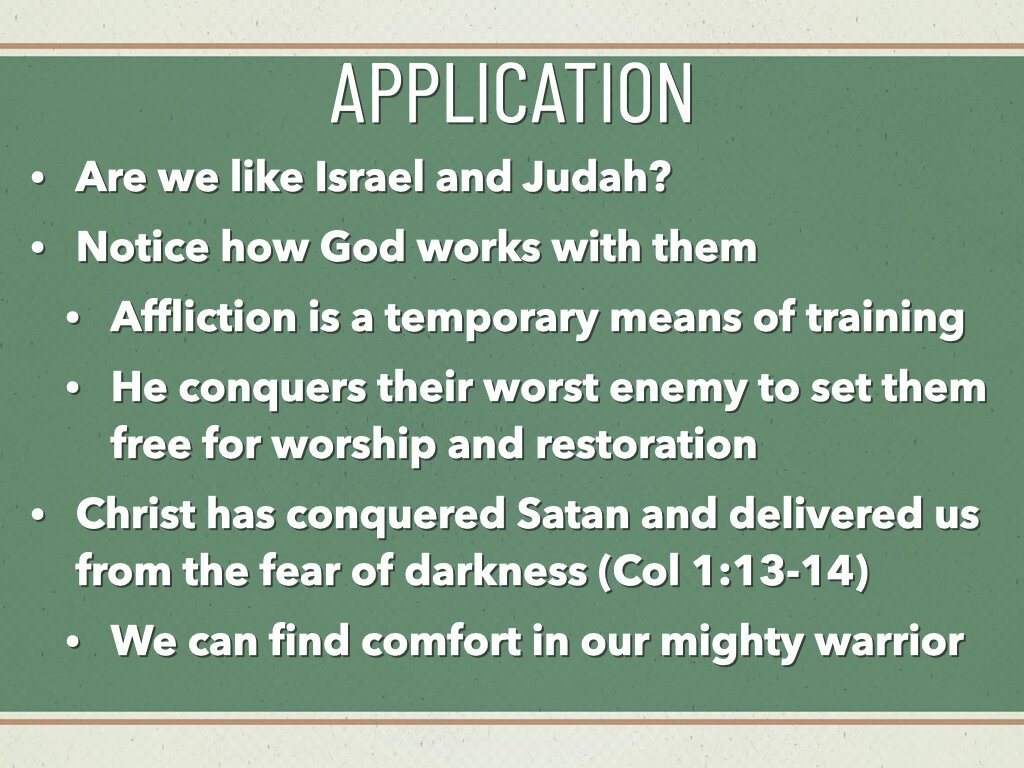An Avenging God (Nahum)
Nahum 1:1 (ESV) --- 1 An oracle concerning Nineveh. The book of the vision of Nahum of Elkosh.
This prophet writes about a hundred years after Jonah and probably within thirty years of Assyria's defeat. Nahum is from a place we do not know anything about. But God told him to write a book about the greatest city the world had ever seen. The Assyrians have been the dominant world power for over 300 years at this point, and their city is a three days journey to walk across. What does God have to say about them?
Who Can Stand Before The Lord? (1:2-6)
Nahum 1:2--6 (ESV) --- 2 The Lord is a jealous and avenging God; the Lord is avenging and wrathful; the Lord takes vengeance on his adversaries and keeps wrath for his enemies. 3 The Lord is slow to anger and great in power, and the Lord will by no means clear the guilty. His way is in whirlwind and storm, and the clouds are the dust of his feet. 4 He rebukes the sea and makes it dry; he dries up all the rivers; Bashan and Carmel wither; the bloom of Lebanon withers. 5 The mountains quake before him; the hills melt; the earth heaves before him, the world and all who dwell in it. 6 Who can stand before his indignation? Who can endure the heat of his anger? His wrath is poured out like fire, and the rocks are broken into pieces by him.
To begin the book, we notice that God does not describe Nineveh. He describes himself. Those who read this book get a very clear picture of who God is in the first six verses. Notice a few details. He says, "The Lord is a jealous and avenging God."
Jealous God
God's jealousy has been described elsewhere in scripture. He is jealous for Israel's heart (Exo 20:5, Hosea). He does not want his people to worship other gods. We also see that he is jealous for his own name's sake.
Exodus 34:14 (ESV) --- 14 (for you shall worship no other god, for the Lord, whose name is Jealous, is a jealous God),
Ezekiel 39:25 (ESV) --- 25 “Therefore thus says the Lord God: Now I will restore the fortunes of Jacob and have mercy on the whole house of Israel, and I will be jealous for my holy name.
Mankind needs to understand the true God of the world. When his name gets tarnished, God has to act to preserve his name. Why does he feel that way? Is it because he is self-conscious like we sometimes get? No, not at all. God's name and God's glory are directly tied to God's worthiness to control the universe. His name and glory are also connected to all of creation's obedience and wellbeing. If we have low regard for God's name, we will pursue manmade gods, and evil will spread. So God is jealous for his name and glory because it makes a relationship with mankind possible. He desires that relationship.
Avenger
Because of this jealousy, God must avenge. He must destroy the one who has conquered his people, blasphemed his name, and failed to give him glory. He will not let them get away scot-free. Notice that verse three brings up two aspects of God's character that have been repeated throughout scripture. The first one is that God is "slow to anger." This points to his merciful side. In Exodus 34, when God describes himself, he uses this phrase to go along with his compassion and mercy. One who is slow to anger does not immediately destroy when someone wrongs them. This person gives time to repent and forgive. That's who God is primarily, so that is why he describes himself this way.
But there is another phrase in verse three from that same description in Exodus 34, "The Lord will by no means clear the guilty." Doesn't that phrase always throw us off? If he will by no means clear the guilty, how is he going to forgive people? That seems opposed to God's merciful nature. Many people struggle with this because they want to believe in God's compassionate side, but they want to reject the unforgiving side of God.
The truth is that God is both. He forgives those who turn from their ways, but he will destroy all who refuse to repent. Their guilt remains on them because of their rebellion. The rest of this book describes how completely and utterly, God can destroy those who have hurt his name by hurting his people.
What Do You Plot Against The Lord? (1:7-12a)
Nahum 1:7--12 (ESV) --- 7 The Lord is good, a stronghold in the day of trouble; he knows those who take refuge in him. 8 But with an overflowing flood he will make a complete end of the adversaries, and will pursue his enemies into darkness. 9 What do you plot against the Lord? He will make a complete end; trouble will not rise up a second time. 10 For they are like entangled thorns, like drunkards as they drink; they are consumed like stubble fully dried. 11 From you came one who plotted evil against the Lord, a worthless counselor. 12 Thus says the Lord, “Though they are at full strength and many, they will be cut down and pass away.”
In the next part, we see that the Lord is good. He doesn't destroy the good in the city. He only destroys those who are evil and who set themselves up against him. The nation of Assyria is plotting against the Lord, as we saw in Psalm 2. How well is that going to go? If the mountains quake in his presence, what chance does a nation like Assyria stand at their full strength?
Their walls were 100 feet high and big enough to support chariot races. They had motes around their city with water that would make it extremely difficult to attack. Who would ever think that Nineveh could fall?
God's People Rejoice (1:12b-2:2)
Nahum 1:12--2:2 (ESV) --- 12 Thus says the Lord, “Though they are at full strength and many, they will be cut down and pass away. Though I have afflicted you, I will afflict you no more. 13 And now I will break his yoke from off you and will burst your bonds apart.” 14 The Lord has given commandment about you: “No more shall your name be perpetuated; from the house of your gods I will cut off the carved image and the metal image. I will make your grave, for you are vile.” 15 Behold, upon the mountains, the feet of him who brings good news, who publishes peace! Keep your feasts, O Judah; fulfill your vows, for never again shall the worthless pass through you; he is utterly cut off. 1 The scatterer has come up against you. Man the ramparts; watch the road; dress for battle; collect all your strength. 2 For the Lord is restoring the majesty of Jacob as the majesty of Israel, for plunderers have plundered them and ruined their branches.
This third section tells us why God's destruction of Nineveh is important to the Jews. First, God says that his use of Assyria to afflict his people is over. During the reign of Hezekiah, we saw the trouble that Assyria caused Israel. They would send messengers and blaspheme God's name. Remember how God destroyed the Assyrian army in 2 Kings 19. He killed 185,000 in one night using an angel. Imagine how reassuring that would be if you were an Israelite. Now God has promised to eradicate Assyria. There will no longer be a yoke on their neck from Assyria. He has plans to restore Israel's glory and majesty.
Assyria's Destruction (2:3-3:19)
The last section of the book makes up the majority of it. Throughout this section, God gives pictures of Assyria's destruction.
1. All that they rely on will abandon them. (Nahum 2:8-9)
2. Their power will disappear. (Nahum 2:10-13)
3. Their plunder will be plundered (Nahum 3:1-4)
4. Their glory will turn to shame. (Nahum 3:5-7)
5. They are not too great for exile (3:8-11)
6. Their fortresses will be destroyed (3:12-15a)
7. They multiply, but there is no loyalty (3:15b-18)
Everyone looks forward to their fall because they are evil (3:19)
God foretold the destruction of Assyria in detail. The Medes and Babylonians would destroy the great city in 612 B.C. It would be so devastated that Alexander the Great would travel through that region three hundred years later and make no mention of there being a city there. No one even knew that Assyria was a city until 1842, when it was discovered. God said he would wipe that city off the map, and he did it!
What's The Message?
1. God Is Just
The first thing we learn is that no nation is too big for God to destroy. Their evils come to the throne of God, and he is willing to destroy them. He is not a pushover. Back in Jonah, we saw humility from the king and nobles in Assyria. This led to them being saved from judgment. However, repentance did not extend to future generations. When they turned against God, he turned against them. Sure, God used them to punish his people and the nations of the earth, but that didn't make them pleasing in God's eyes. They gradually became proud and eviler as they listened to foolish counselors plot against the Lord. The message of this book is that all who set themselves against the Lord will find that he is an enemy who will never lose. He is undefeated in his battles against empires. This is the same God who destroyed Egypt with plagues. He used the evil Assyrian nation to conquer the northern nation of Israel, his people. Now he promises to destroy his destroyer, Assyria. Later, we will see him do the same thing with Babylon.
2. God Comforts
The second point in this book is reassurance for God's people in Judah. God has not forgotten his people. He is willing and able to conquer their enemies. Many believe that Nahum's prophecy came during the latter part of Manasseh's reign. If so, God was foretelling the destruction of the Assyrians in response to Manasseh's repentance. During Josiah's reign, the nation of Judah enjoyed peace and prosperity as Assyria started breaking down. Towns destroyed in Israel were being rebuilt, and Josiah tried to turn their hearts back to the Lord. The prophecy of Nahum probably fueled that fire. The people were encouraged by God's promises to destroy Assyria. They could see a path to dominance. I love the four verses of comfort in this book (1:7, 12b-13, 15, and 2:2). These verses show that God has not forgotten his people. He still has plans for them. He is setting them free from this yoke like he will free all people from the yoke of sin one day.
Application
How does this book help us? First, if we want to grow from our study of this book, we need to look inside ourselves and compare ourselves with the Assyrians. Do we oppose God with our stubborn pride? Maybe our lives are going great, and we are stronger than ever. That doesn't mean that we can abandon God or stop relying on him. He is the reason for our success and strength. Without him, we are nothing. We need to heed the warning. Those who defy our God will find this kind of judgment against them. Don't fool yourself into thinking that you will win that battle.
We need to realize some things are true of us if we turn away from God.
1. Whatever we rely on instead of God will fail us.
2. Whatever power we have can be taken away.
3. All our goods can disappear in a day.
4. Our glory can quickly turn into shame.
5. Having a great life does not mean we did it or that it will be eternal
6. Our security and walls are not too great to fall
7. All our friends could turn away from us in an instant
Don't think that God's forgiveness in the past gives you free rein in the future. God expects continual obedience and submission to the will of God. He wants a relationship with us. He is jealous for our hearts and his own name's sake. He is slow to anger, but he will by no means clear the guilty who persistently rebel against him. Don't test him.
The second thing we need to do to grow from our study is to compare ourselves to Israel and Judah. Notice how God works with them. He allows Assyria to exist so that he can afflict them. That might not make sense to most people. People who say, "If there was a God, he wouldn't let this happen," don't understand this. God allows his people to suffer because they are spiritually rebelling against him. He is continually trying to turn their hearts back to him. Israel was given so much patience and grace by God, but their rebellion led to captivity. Now Judah has been given even more patience and grace. God gives them plenty of reason to trust in him. If he can bring down the most significant enemy they have ever known, why wouldn't they put their trust in him and obey his commands?
This book shows us that he is such a compassionate God. He does everything in his power to convince his nation that he has control. He removes Assyria to show his people that he is worth serving. If they turned their hearts to him, complete restoration and majesty would return.
We need to see the great victory God has given us in Christ. Through Christ, God has rescued us from the domain of darkness and brought us into the kingdom of his beloved Son (Col 1:13-14). The salvation of the Lord means complete restoration and majesty for us. We can be wholly forgiven and filled in Christ. This book was supposed to comfort God's people by revealing God's victory over their enemy before it even happens. The New Testament reveals God's victory over sin and death before Jesus leads the way through resurrection.
Conclusion
If you have set yourself against the Lord, be afraid and understand who you are trying to defy. He is jealous for his name, and he will be undefeated when his creation rages against him.

